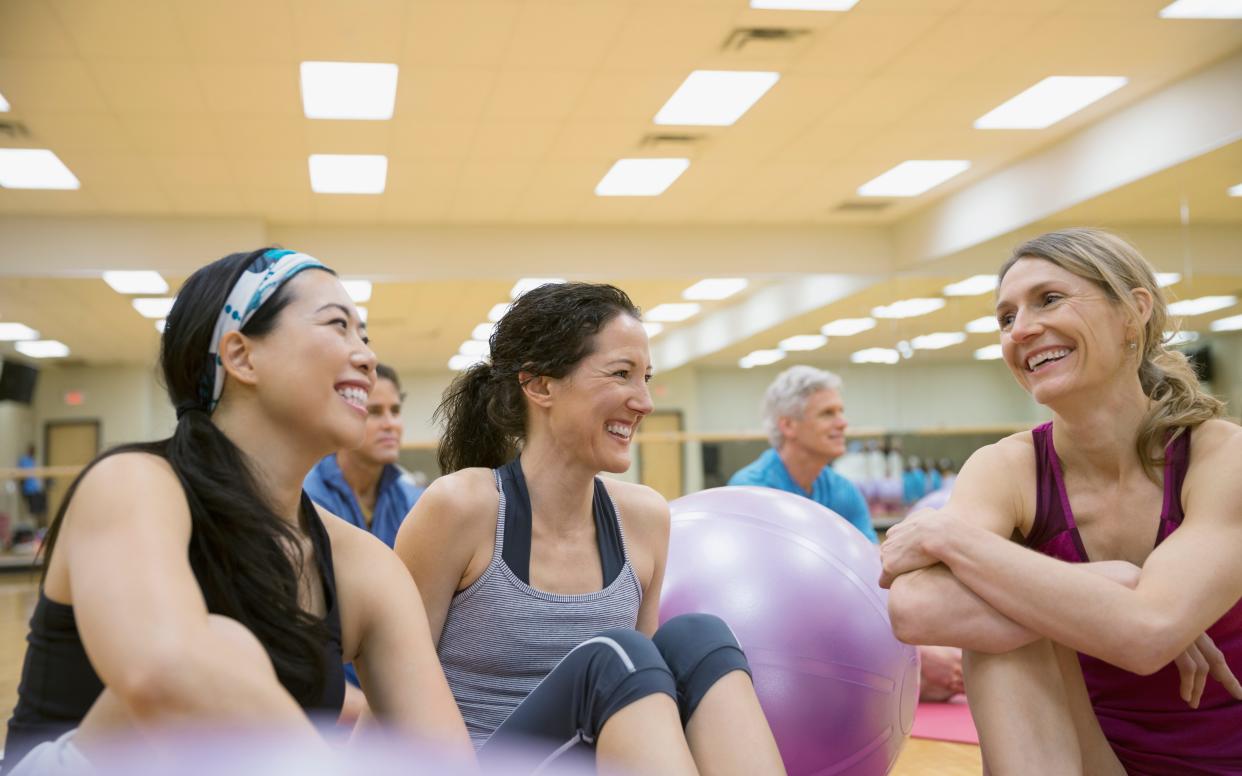No time to see your friends? The social 'quickie' is the answer

I haven’t seen much of my friends recently. I’ve been overwhelmed with work and family commitments so I’ve pared back my social life. Girls’ weekends away, rowdy BBQs, lazy evenings at the pub – I’ve put them all on hold until I can carve out the time. Except, when I think about it more, I have actually seen some of my friends lately.
I saw Corienne on the train platform last week, and we nattered all the way to work, a half-hour catch-up when we probably should’ve been ploughing through our inboxes.
I bumped into an old university friend, Steph, while I was on a work jolly at a stately home, one of those joyous ‘what the hell are you doing here?!’ moments. We stole away for a 10-minute download over a cup of tea, covering the latest newsflashes about our lives.
The social quickie holds particular appeal for time-pressed working mothers
And I went to a yoga class with my friend Rebekah, chatting 19-to-the-dozen during the short walk there, before studio etiquette forced us into Zen-like silence.
I’ve heard a New York fashion editor refer to it as a ‘micro-hang’, but let’s call it the social quickie, complete with pleasingly British, Carry On connotations.
Once upon a time our social lives comprised full evenings, days or weekends – hefty chunks of time with friends – painstakingly planned months in advance, looming in our diary and often oppressing us to the point that, when the event in question finally rolled round, we’d do anything to get out of it.
But these days we’re keeping things short and sweet.
The social quickie holds particular appeal for time-pressed working mothers.
Says one friend, ‘It’s a great way of using up those offcuts of time when you’re driving kids around to various activities that only last an hour, so you don’t have time to go home before pick-up. If another mother and I can find a café nearby for a swift coffee then great, but I’ll even settle for a quick chat in the car.’
Younger friends with a pathological fear of forward planning are fans, too. One 24-year-old I know has befriended her neighbour and they occasionally walk their dogs together. They text each other on the way home from work but there’s no pressure to commit, and if it does happen she gets a buzz from the multitasking aspect – socialising while doing chores.
Another friend says, ‘You often have the best time when you see someone for a quick and, ideally, spontaneous glass of wine. I love the fact there are no expectations, no room for disappointment.’ The social quickie is largely a female phenomenon.
The thing the happiest people have in common is that they consistently maintain social interactions
As Washington Post journalist Brigid Schulte points out in her book Overwhelmed, men tend to be better at carving out lengthy periods of free time – the Sunday-morning bike ride with the boys, the all-day drinking session to watch the football. Women, meanwhile, are more likely to have what Schulte memorably calls a ‘minute vacation’.
Modern lifestyles mean crunched-down friendships, agrees New York psychologist Ty Tashiro, author of Awkward.
‘We socialise in snack-sized portions because we prioritise other activities over social time. Results from an American Time Use Survey suggest that each day the average person spends almost nine hours at work, more than three hours watching television or on their computer, and less than an hour engaged in social activity.’
And, of course, spending three hours daily on those screens most likely involves fiddling about on social media, which by its very design encourages us to have large numbers of friends with whom we have short, light interactions. It may not be as fulfilling as, say, a weekend away with the girls, but Tashiro believes the social quickie has its place.
‘The benefit is it reminds us of our need to belong, to be part of a group that supports us. Researchers who study happiness find that the thing the happiest people have in common is that they consistently maintain social interactions that are positive and supportive.’
However, Tashiro adds, ‘If your social life is all snacking, then it’s hard to get the sustenance that we need to feel understood and supported.’
Psychologist Corinne Sweet, author of The Anxiety Journal, also sounds a note of caution: ‘It takes time to build and deepen relationships. If you do everything at speed, it’ll all be superficial. It’s important to take time to fill in the gaps in-between social quickies, otherwise friendships will flounder.’
If your social life is all snacking, then it’s hard to get what we need to feel understood and supported
As for the future of friendships, will we forgo chatty nights down the pub for whizzing silently past our best pals in the street and giving them a Facebook-style thumbs-up gesture? ‘If we follow the same trends from the past three decades, then each person will average less than 30 minutes of social interaction every day,’ says Tashiro.
‘But my informal observation is that we are becoming aware of the dangers of isolation and shallow social interactions. And I think we’ll realise that our daily duties are not so tedious when we can work together with our friends and family.’
Which suggests that the dog-walk catch-up may well catch on. As for my own now unusually empty diary, I’ve just scheduled in a speedy game of tennis with a friend at the weekend, while our children are at a party.
But I’m also hammering out the finer details of a visit from old friends who live in the US, whom I’ve invited to stay for a couple of days. I’ve realised we need some quality time together. After all, friendships sometimes need a full servicing rather than just a quick fumble.


